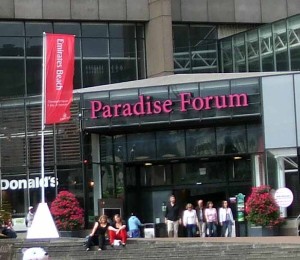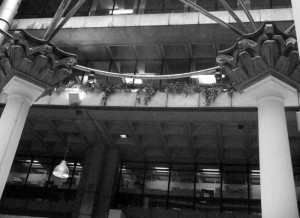Alan Clawley questions the openness of The Forum and reminds us ‘public’ spaces are becoming hard to find.
I suppose whoever it was who had the idea of naming the concourse under Birmingham’s Central Library ‘Paradise Forum’ could have been inspired by the neoclassical architecture that surrounded it on all sides. It would be more correct to change it to something more prosaic, like ‘The Library Arcade’, but perhaps it’s churlish to deny creative licence to marketing people. After all what do the names ‘Palasades’ and ‘Pavilions’ convey to the shoppers who enter their doors?
The lease to Paradise Forum was bought from the Council by Rugby Estates in 1990 who played up to the image by plonking Roman-style statues on the flat roofs of the shop units. That was not only tacky, it could never turn the place into anything remotely like a genuine Forum.
Today Paradise Forum is leased and managed by Argent plc who sensibly removed the statues and spent £2 million doing it up in a more modern ‘high-tec’ style.
Just to see what a Roman Forum was I consulted Lewis Mumford’s book, ‘The City in History’. He writes, ‘According to tradition, Rome was constituted by the union of various foreign tribes of the neighbouring hills, under the leadership of the Romans themselves, perched on the Palatine. The symbol of this union…was the foundation of a common marketplace (the Forum), with a place of assembly or comitum, which was also used in the early days for athletic and gladiatoral contests’.
The reference to ‘athletic contests’ reminds me that Birmingham Council once planned to build a sports institute in Paradise Circus north of the Central Library, while the reference to ‘gladiatorial contests’ reminds me of the modern virtual equivalent such as our own ‘Restirred Forum’. It seems that the spirit of Rome was and is still alive in modern Birmingham.
Mumford continues, ‘The forum was not simply an open square. As it developed in Rome, it was rather a whole precinct: Complex in layout, in which shrines and temples, the halls of justice and council houses, and open spaces framed by stately colonnades played a part, Within these spaces orators could address large crowds; while for inclement weather large halls, basilicas, served in many capacities. As succeeding emperors added directly to the Forum or, like Julius Caesar, founded a new one in the vicinity, ever larger crowds would be drawn to the centre for shopping, for worship, for gossip, for taking part, as spectators or actors, in public affairs or in private lawsuits.
Not quite the cramped and crowded ‘mini-mall’ called Paradise Forum. Any citizens gathering there to discuss issues of the day would be ejected within minutes by Argent’s security guards helped if necessary by police officers equipped with full riot gear. An anti-McDonalds protest that I took part in some years ago was quickly asked to leave the premises. Not only is Paradise Forum too small for a public assembly, but the owners can decide who enters it. What was once a publicly-owned space open to all – including skateboarders, glue sniffers, rough sleepers, preachers and buskers – is now a tightly-controlled and sanitised private space.
There are still open spaces where people can assemble but others where they cannot. London has its Speakers Corner but the ‘OCCUPY’ protesters have found that their tents are not welcome on what they thought was public land. Perhaps they could have got round the problem by organising a continuous standing or walking assembly and carried umbrellas instead of pitching tents. These public protests do show the need for places of public assembly that are not controlled by commercial interests and to which admission is free. The big public squares that still exist in the cities of North Africa and the Middle East were used very effectively during the recent uprisings.
If Argent is to build a new Paradise Circus along the lines of Brindleyplace and Paradise Forum, we are likely to get more of the same privately-controlled streets and mini-squares where spending or making money is the primary activity.




